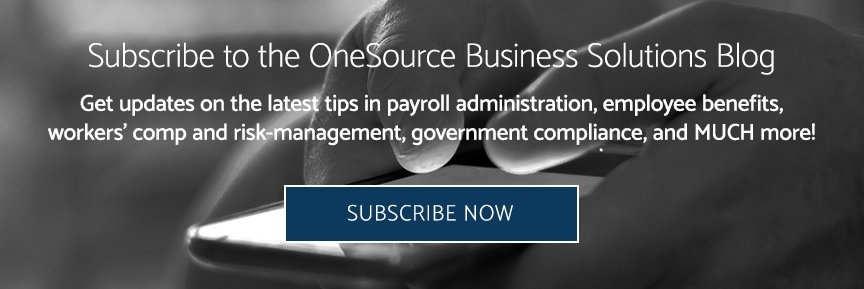OneSource Business Solutions Blog
Health Benefits Outsourcing: Pay Less and Get More

Rising healthcare costs are hitting everyone hard.
For smaller employers, this often means providing inferior coverage or being unable to cover children and dependents. Alternatively, it means raising the employee share of premiums, possibly to levels employees cannot afford without tightening their belts in other areas. This makes it harder to compete for talent; having good health insurance is a necessity, not a luxury, for many employees. Expensive health insurance also means that your employees are less happy, more stressed, and less productive.
Health benefits outsourcing is a great way to control these costs and offer better benefits at a lower price.
What is Health Benefits Outsourcing?
Health benefits outsourcing is outsourcing the process of finding good benefits for your employees at an affordable price. This can save a lot of time and money and help you find a better option than you might uncover on your own. It is slightly different from employee benefits administration outsourcing, which is letting a third party handle managing health benefits.
You can outsource one or both of these processes. That’s one reason why many companies partner with a Professional Employer Organization; PEOs provide both sides of benefits outsourcing as well as numerous other benefits, including reduced premiums and a higher level of expertise at a fraction of the cost of adding another HR employee.
Why Do Companies Outsource Health Benefits?
There are many reasons why a company might choose to outsource health benefits. Benefits outsourcing can give you a number of significant advantages that can help you attract and retain talent.
Cost Savings
For many companies, the choice to outsource health benefits is simply about costs. When partnering with a PEO, you can gain access to that PEO's group health insurance, at a lower rate than you can get by yourself. Because the PEO has thousands of employees, they have a much larger risk pool, and insurers will give them a better deal. This is made possible through a co-employment agreement.
Time Savings
Researching health insurance offerings can take time. You have to look through multiple vendors, call multiple brokers, and mess around with licensed resellers and benefits advisors. Instead, you can let your outsourcing provider handle all of this.
If you choose to go with PEOs plan then you will only need to decide things such as the deductible level. If you work with them to find a personalized plan, they can do so much faster than you can, and with a stronger awareness of best practices and what you should be able to get for your money.
Improved Offerings
Organizations that partner with a PEO can also offer much better benefits than going it alone. You can gain access to retirement plans and other healthcare offers such as health savings accounts (HSAs) and flexible spending accounts (FSAs).
You can put together a package that fits your employees’ needs without them having to pay high rates. Given the number of employees a PEO can bring together, niche benefits can become much more feasible.
This all helps attract talent and reduce turnover. It reduces the risk of a key employee leaving because you could not provide a needed benefit during a crisis.
Legal Compliance
Compliance requirements change over time and depending on the size of the company. For example, if you have fifty or more employees, then you need to worry about ACA compliance. Knowing whether the plans you offer fill the ACA's requirements in terms of coverage and affordability can be a challenge, and many companies are left taking a vendor's word for it.
The HR experts at a PEO ensure that your health plan is going to be ACA compliant. You don't have to worry about picking the wrong benefits package, or about missing open enrollment and leaving employees without coverage.
The same applies to smaller companies subject to laws such as the Fairness and Labor Standards Act.
Health Benefits Outsourcing as a Solution
For many smaller companies, health benefits outsourcing is the best (and often only) way to provide the kind of benefits employees expect at a lower cost. This then results in a better employee experience, increasing productivity. By partnering with a Professional Employer Organization, you can control costs without cutting benefits or putting a higher cost burden on your employees.
Recent Posts
Posts by Topic
- HR Outsourcing (37)
- Employee Benefits (14)
- Payroll & HR Administration (5)
- Strategic Planning & Research (5)
- Company Culture (4)
- HR Compliance (4)
- Industry – Professional Services (4)
- PEO (4)
- Workers’ Comp (4)
- Employee Turnover (3)
- OneSource PEO Company News (3)
- performance management (2)
- Navigating COVID-19 (1)
- manufacturing industry (1)
